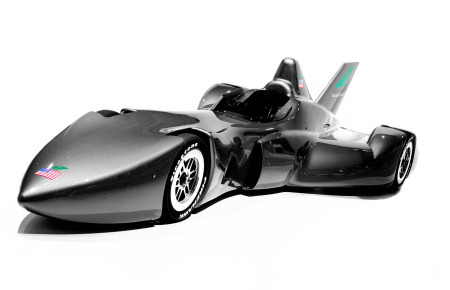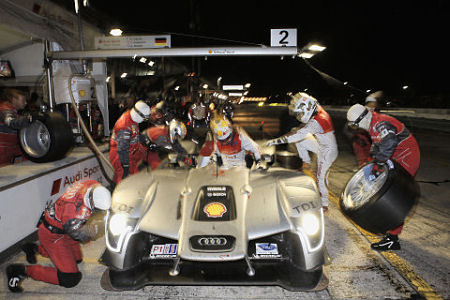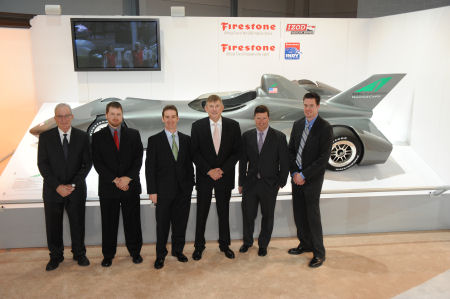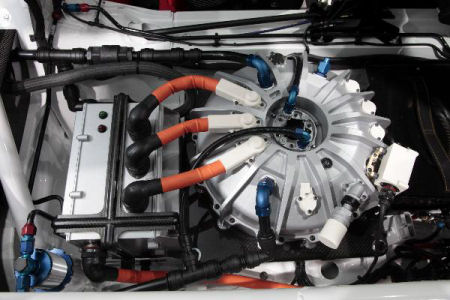The Way It Is/ Rediscovering racing's true self
by Gordon Kirby Take heart all you foes of spec car racing who yearn for the return of racing's Dan Gurney-like spirit of innovation. Your frustrations are being heard and it's great to see a guy like Chip Ganassi take a leadership role in trying to push the sport to re-embrace its roots and become technologically and socially relevant to the changing times. Ganassi was bold enough to make some very clear points at last month's Motor Sports Hall of Fame annual induction ceremony in Detroit and he put his money where his mouth is by paying to conceive and design the Delta Wing.
Take heart all you foes of spec car racing who yearn for the return of racing's Dan Gurney-like spirit of innovation. Your frustrations are being heard and it's great to see a guy like Chip Ganassi take a leadership role in trying to push the sport to re-embrace its roots and become technologically and socially relevant to the changing times. Ganassi was bold enough to make some very clear points at last month's Motor Sports Hall of Fame annual induction ceremony in Detroit and he put his money where his mouth is by paying to conceive and design the Delta Wing.
Despite being spurned by IndyCar's 'Iconic' committee the message of the Delta Wing has not been lost on the rest of the racing world. Formula One will adopt many of the Delta Wing's principles in its 2013 formula with smaller external wings and more downforce produced by the underbody. F1 will also move in 2013 to a high performance version of the 1.6 liter four cylinder turbo engine around which the Delta Wing was conceived.
Meanwhile, over the past month or so Delta Wing CEO Dan Partel has enjoyed some encouraging meetings with auto manufacturers in America and Europe discussing the state of the fast-germinating 1.6 liter in-line, four-cylinder 'Global Racing Engine'. Partel is increasingly confident that a Delta Wing prototype will be built and tested and says he wants the car to undergo a thorough testing and development program and at this point he reckons the Delta Wing will make its race debut in 2013.
"I am working flat-out to honor two commitments I have made," Partel said. "Number one is to get the Delta Wing racing and number two is to get Chip back his investment. The first step will probably be satisfied a couple of years earlier than the second and my brief when I was brought in was to achieve those two goals.

© Chip Ganassi Racing Teams Inc
Delta Wing designer Ben Bowlby echoed Partel's confidence in the car's future.
"We completely believe that something is going to come along but it hasn't actually got to the point where we can say anything," Bowlby said. "We've got some irons in the fire and I think one of them is going to turn out just superbly red-hot. A meeting is going to happen sometime soon with all the right people. So I would say, watch this space."
Partel is equally convinced the FIA's 'Global Racing Engine' is going to happen. He says each of Chevrolet, Ford, Mazda, BMW and the Vokswagen Group will unveil 'GRE' four-cylinder racing engines over the course of the next year.
"Chevrolet, Ford, Mazda and BMW are up and running and will be available to customers six months after they have raced," Partel commented. "The FIA regulations for the 'GRE' will require the automobile manufacturers to sell or make available to the public the basic components of their engines within six months of entering competition. There's a great variety in the prices but we believe we will be able to buy production engines that would require a dry sump lubrication kit and a few other bits and bobs for $50,000. This whole thing has been well thought-out by the engine manufacturers working with the FIA and obviously they are going ahead with it. It's a cheap, affordable way for the auto manufacturers to go racing across a wide range of categories in difficult economic times."
Partel says he doesn't understand why IndyCar's 'Iconic' committee made the decision to focus its 2012 engine rules on Honda's 2.4 liter turbo V6.
"Now that the Chevy, Ford, Mazda and BMW in-line four engines are available," Partel remarked. "I'm perplexed about how the 'Iconic' committee came to the conclusion that nobody wanted to supply an I-4 engine. I believe the Speedway cannot survive in the longterm without the participation of multiple automobile manufacturers."

© LAT USA
"Ten companies have been involved in the process," Baretzky said. "There's a clear sporting agreement between most or nearly all of the manufacturers and a lot of the sport's groups or teams see that this is the way to go. But as they say, Rome was not built in one day. These things take time but there's a really big interest in the in-line, four-cylinder 1,600 cc 'Global Racing Engine'."
Baretzky is intrigued and excited by the Delta Wing concept.
"I found this a great and encouraging idea," Baretzky grinned. "It's a really dramatic step but I think that's what's needed. If you really want to have environmentally relevant motor sport then you have to make a big step and the Delta Wing does that. An important part of its design concept is to cut everything by two--half the horsepower, half the weight--but keep the same level of performance or even make it better. It's a drastic step and that's what you need. Even if it ends up being something different but similar, it's the right thing to do in my opinion."
Ben Bowlby met Baretzky at Sebring last spring while Audi was testing its latest Le Mans car and the two men discovered they were on the same page on a wide variety of issues.
"I had some very long conversations with Ben Bowlby," Baretzky says. "He came to Sebring to talk to me and it was a very good conversation. We have a really common concept of what has to happen in motorsport. After all the discussions I had with the IRL guys two years ago and with a lot of other companies last year concerning the 'Global Racing Engine' I think there's a huge common understanding of what has to happen in motorsport in the near future."
Porsche raced its new 911 GT3 hybrid at the Nurburgring last month and the car will make its American debut at the Petit Le Mans ALMS season-closer in three weeks. Bowlby emphasized the value to Porsche in using racing to develop its hybrid sports car.
"Porsche reckon that racing shortened the development cycle on their hybrid GT3 car from seven years to three," Bowlby noted. "And that cost-saving is so great that it more than justified the expenditure of doing it through motor sport. It fast-tracked the process because of motivation, which is another return on investment."
Engine designer Mario Illien and many others in the industry say many businesses that have invested in building and developing energy-restoring components and hybrids will come into racing and help change the face of the sport.

© Chip Ganassi Racing Teams Inc
Ten years ago Barnard tried to push the FIA and F1 towards hybrids and energy-saving systems. Barnard was hired by FIA president Max Mosley to make recommendations and write a report about these things, but that was the end of it. Barnard heard nothing more from Mosley who no doubt adopted them for his own use in later years. Thus is the nature of politics. But Barnard sees the successful arrival of turbo diesels from Audi and Peugeot at Le Mans as a harbinger of a big uptake in green technology and racing.
"The diesel cars at Le Mans are just the beginning because the FIA is talking about adopting energy-saving technology systems in Formula One," Barnard said. "You've got plenty of this stuff out there on the latest road cars including alternators that only work under braking conditions and so on and I should think you could almost bolt that stuff on a racing car tomorrow. There are all sorts of elements like that."
Barnard believes hybrid technology will be a great promotion and marketing tool for racing for all the right reasons.
"You will only have to get a hybrid racing successfully to immediately get a whole other set of people wanting to buy hybrid cars," he remarked. "I guess many Hollywood stars have been waving the green flag by buying a Prius and if racing adopted hybrids it would just change the whole perception of them to a whole other group of people."
The VW Group's takeover of Porsche is proceeding as we speak and will take most of the next year to complete. Motorsport is essential to both Audi and Porsche of course, but it will probably take a little time for the VW Group to determine its overall motorsport policy and which brands will race in what categories.
"At the moment there are a lot of internal politics going on inside the VW Group so it's difficult to say what's going to happen," Dan Partel said. "But I have no doubt that Volkswagen-Audi will supply in-line four-cylinder 'GRE' engines in the future. It will be suitable for them to use in their SEATS in the Touring Cars and for the Skodas for World Rally. So to use it for the Delta Wing and for World Rally and World Touring cars would be a very efficient concept for three brands to use the same engine. That decision would be speeded-up if it was confirmed that the Delta Wing will race."
Of course, Ben Bowlby designed the Delta Wing very much with the 'GRE' in mind.
"Talk about a perfect fit," Bowlby noted. "All these manufacturers are committed to build Global Racing-type engines but they haven't necessarily got a high-performance outlet. By the end of next year these engines will be readily available and they're not bad pieces at all. For the Delta Wing they're just about perfect other than being not as light as they could be. But all in all, they're a perfect fit for the Delta Wing."

© Porsche Cars North America, Inc.
"I believe we have amazing versatility," Bowlby observes. "We can go whichever way we need to go, even in terms of cost structures. We could get a long way out there with the most crazy, modern technology. There's some big stuff happening in the auto industry after the first wave of efficiency gains. There's some pretty wild stuff beginning to happen out there and it's almost like Silicon Valley is going to be leading it. It's our opportunity in motor sport to get back to having a purpose.
"Look at how every youth, male or female, is attracted for some intangible human characteristic or reason toward the latest labor-saving or communications device. A twelve-year old child today assumes they will own a cell phone and have the latest in technology at their fingertips. That is the status symbol to these young kids, that high-tech power of communication and access to the incredible world that technology brings you. To deny that in motor racing means that in one fell swoop you've crossed racing off the desirability list of the youth of America and the world."
On another front, Dan Partel believes that IndyCar's push for cost-savings with its 2012 formula was driven entirely by the Delta Wing.
"The price reductions with the new Dallara chassis and Honda engine are a direct result of the Delta Wing," Partel commented. "The teams demanded the price reductions and the Delta Wing put the pressure on to reduce the price. Ben's Delta Wing concept included building the car in Indianapolis and creating 150 jobs as well as reducing the cost of building the car. Delta Wing put forward the concept of building a one hundred percent American-built car.
"So all the teams can thank Chip Ganassi and Ben Bowlby for concept of reducing the cost and building the cars in America. In fact, the Delta Wing was the most effective negotiating tool that Randy Bernard had. The $5 million from the state of Indiana was also a result of the Delta Wing. John Barnes set up a meeting with Ben and Chip with the governor and originally they allocated the money to Delta Wing to build cars in Indiana."
Partel says he hopes the Delta Wing will race at Indianapolis in 2015 following the three-year span of the new Dallara-Honda formula.
"My job is to make sure the Delta Wing will be a very competitive option for 2015," Partel commented. "By that time the Delta Wing will be racing someplace else and will be fully-developed and ready to provide a great option for 2015.
"I just think it's a shame that we couldn't race the lightweight Delta Wing with an I-4 engine against the Dallara-Honda combination. It would have been like Jack Brabham and Jim Clark arriving with their lightweight Cooper and Lotus chassis with different, more economical engines. I believe that prospect would have sold-out the Indy 500 in 2012 and '13 and completely re-energized the place."
Finally, some observations from Steve Horne, a former CART team owner and before that a team manager in CART, Can-Am and Formula 5000. Horne usually shows up at Indianapolis, just to look around, and this year he was drafted by Andretti Autosports to help call the raceday strategy on Tony Kanaan's car.
"Looking from an ever increasing distance, apart from a brief refresher at Indy, I see the same basic problems," Horne said. "It ain't a profitable business model for an owner. For a short period in the mid nineties it was, and I was lucky to be on the train, however, nowadays it just isn't and I think it will just get a little worse year by year for owners. Currently it is still propped up by the winners circle deal but that has to be hurting The League.
"Randy Bernard has clearly made a major difference in the way the current model is operating but his direction in my opinion will not have a lasting impact on the series in the years to come. Fundamentally the business model for participation for owners and fans has to change dramatically. It can no longer be a totally passive one for the fans. The new car program goes some ways towards that for the owners but I don't think in my humble opinion it does anywhere enough to increase the awareness and excitement of the sport for the drivers and the fans.
"I just don't think a rehash/iteration of the current business model based around the Dallara concept will move the sport out of the doldrums and its ongoing race to the bottom," Horne added. "As is happening in NASCAR, auto racing is losing its edge, innovation and excitement in the sports race. I really felt deep down that the Delta Wing concept would have allowed both a major significant reduction in costs for the teams along with a dramatic and significant uplift in fan and sponsor appeal. The concept had and has so much appeal to today's and tomorrow's generation that it would have been a major change in the whole sport and business model."
Horne enjoyed his time at Indianapolis but is dismayed at the current formula. Like many of us, Horne doesn't understand why Brian Barnhart can't grasp that the restrictor plate-style of racing he has helped create is not only incredibly dangerous but also has very little fan appeal witness the steadily declining crowd counts at all IndyCar oval races.
"My sojourn at Indy this year had two aspects for me," Horne said. "I genuinely felt a strong tug back to the sport and the 500. All the people whom I hadn't seen for years both as competitors and officials were very welcoming and gracious. The Speedway and the race still had the same tug. But to a man the competitors hated the dumbed-down Dallara and the cookie cutter rules and lack of innovation, whereas the officials seemed trapped in a time warp of this is the way it is now. Not a recipe for ongoing success. The drivers to a man disliked the cars and style of racing and seemed to feel that they were 'racing' in a way that was alien to them. I look at races like Chicagoland and Kentucky and wonder whether 'bumblebee' racing is exciting or just dumb and scary with a major accident waiting to happen."
It takes guys like Bowlby, Ganassi, Partel, Baretzky, Barnard, Illien and Horne and companies like Audi and Porsche to push racing forward. With the spirit of innovation burning in their hearts and minds these fellows and great sporting auto manufacturers like Audi and Porsche will continue to outwit the dreaded bureaucrats and quite literally save the sport.
Next week, I'll take a look at why the ALMS may be the only form of American racing that's on the right track for the future.
Auto Racing ~ Gordon Kirby
Copyright 2010 ~ All Rights Reserved
Copyright 2010 ~ All Rights Reserved
Top of Page